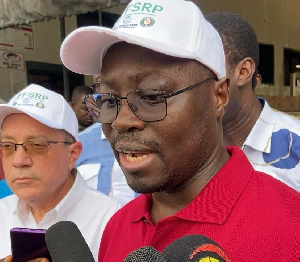Opinions of Tuesday, 29 December 2020
Columnist: Owura Kwaku Adutwum
How could Ghana government be so wrong on classification of agro processing machinery?
N/B Disclaimer: 2020 Elections is over so you can trust that my analysis is not politically motivated nor biased towards any party for any reason. I am just publishing my recent experience in Ghana as of December 2020 for fellow entrepreneurs/importers / Investors to be informed on what is actually happening on the ground and thread with caution without being misled by the present government’s plenty slogans and feats.
We are all aware of excessive post-harvest losses that farmers in Ghana suffer across the country.
In-lieu-of this cyclical annual fate of peasant farmers, I imported machinery to Ghana last month (November 2020) with the hopes of starting an Agricultural processing business in a rural community as my contribution to help the Agricultural Sector curtail post-harvest food and income losses.
Prior to purchase and importation of the machines, I had listed all the machinery I intended to purchase from abroad and checked with the Ministry of Agriculture to see if the equipment would benefit the Agricultural sector in any way. I did get a favorable response informally from the Agricultural Ministry, with the caveat that the final tax exemption determination would involve further evaluation of the actual packing list of items upon arrival of the machinery at Tema Harbor.
I went ahead to procure all the needed Agro Processing Machinery for my business and shipped them to Ghana as a complete Agro-Processing plant. Upon the Machinery’s arrival at Tema Harbor, the Ministry of Agriculture followed their due processes and indeed approved most of the items on the packing list, with the exception of machines that they felt could potentially be used for other purposes other than agro-processing e.g. power generators. I was not too happy about their exclusion of power generators, but could not complain. It is obvious that any rural-based agro-processing operations that use machinery would also need electricity generators of some sort to power the machines, but in Ghana, NO WAY!
Applications for duty and tax exemptions were sent to both Ministry of Finance and the Ministry of Food and Agriculture Ministry to request for exemptions of CEPS Duty, VAT and other levies on my machines. I am not so clear on how their processes work internally between the two Ministries, however, I do know that CEPS / Ghana Revenue Authority gets to have the final approval of Agricultural Machinery Duty Exemptions.
The next step in the clearing process of the machines was to hire a Clearing Agent who amongst the many convoluted responsibilities was to enter details of my import into the “New Paperless System”.
After two weeks of having my imported container sitting at Tema Harbor, and I hold in my hands recommendations from two branches of the Government, stating that my Agro-Processing Machinery should be exempted from duty, my fate was actually left to face the discretion of CUSTOM OFFICERS.
Few days later, I was informed by the Clearing Agent that my Import details were successfully entered into the System, I was given formal consignment documents from Ministry of Trade & Industry, and Ministry of food & Agric (from “system”). A third document that I was to receive, I believe was the Bill of Entry / validated customs declaration form, which I was told GRA / Customs Division was responsible for issuing.
It was at this point, that I heard the biggest shock and awe ever. Ghana Revenue Authority / Customs Division had put a hold on my whole clearing process, stating the reason that, “THE MACHINES ARE FOR MANUFACTURING PURPOSES AND NOT FOR AGRO-PROCESSING” therefore I should go back to Ministry of Finance for an approval letter if I needed exemption. Remember I had stated earlier that my packing list had been reviewed by Ministry of Food & Agric and determined to qualify for exemption with some exceptions?
I went to the Ministry of Finance to request for the said approval and I was told that” I did not require another letter from Ministry of Finance as demanded by Customs since Ministry of Food & Agric had already given a first level approval and subsequently by DTRD and Customs, the application I held was valid, provided the items are exempt items.” So readers, is this not confusing enough or am I just stupid to comprehend? However, the last bit bothered me, i.e. “valid, provided the items are exempt items” so I asked these questions.
Our dialogue went along these lines.
Importer: Are Agro-Processing Machines exempt items?
GRA/Customs: Yes, they are exempt items.
What kind of machines did you import?
Can you show me some pictures and videos?
Importer: Here is the list of items with some pictures and videos; they include corn grinders, vegetable peelers, slicing machines, fruit juicers, dryers and packaging machines. All these machines cannot be used for any other purposes besides Food and agricultural produce processing.
GRA/Customs: I see, but these are for Manufacturing and not Agro Processing.
Importer: Why? Ministry of Food & Agric determined that my machines are Agro-processing machines and recommended that you exempt them from Duty and other levies. How is Agro-Processing different from manufacturing?
GRA/Customs: Recently, the Government of Ghana has revised it’s laws to consider all these machinery you imported as Post-Harvest machines.
Importer: Post-Harvest? So what…? You have to harvest the farm products before you can process them right? Are you saying corn mills and food grinders are not Agro-Processing machines?
GRA/Customs: No corn mills are not Agro-processing; The new recently changed regulations says that, if the machine is used for crops Post-Harvest, then they are Manufacturing machines and therefore you need to pay full taxes on them. Any machine that you do not use on the crops directly on the farm is no longer classified as Agro Processing. Post-Harvest food processing Machines are now classified as Manufacturing machines which we cannot exempt taxes.
I wanted to ask where I can see the new laws but hesitated since customs still held custody of my imported items and was capable of frustrating the hell out of me. Customs bluntly asked me to “talk to them” to get my goods cleared or face the daunting task of thorough examination and valuation. What would you do at that point when your container is docking at Tema Harbor for almost three weeks? It felt like being held hostage at gun point for ransom in a very formal way, and in broad day light using my country’s own laws. The fact is the present government has recently made profound unfavorable (hostile) changes to duty rules for Agricultural Machinery exemptions in an attempt to scramble for revenues to make up for cutting import duty on certain items e.g. vehicles.
Obviously, whoever came up with these bad laws was so tunnel minded, focusing only on increasing revenues for Ghana Revenue Authority and forgot to think through broader implications on the Agric sector, post-harvest losses and Food Security in the country in General. I quickly came to terms with the fact that the nasty new rules (if true) were not in my favor as an Importer and entrepreneur. I had no means to verify what the customs officer was telling me was indeed accurate information or not.
I strongly believe what GRA/CEPs ought to say was that, Farm Machinery fall into one category and Agro-Processing machinery fall into another category etc. Rather than breaking machines into broad classes by Pre-Harvest and Post-Harvest. Ghana government must also acknowledge that Agro-Processing starts from day -1 of harvesting crops up until the produce is processed into forms of packages that add value and/or longer shelf life for storage.
To say that a mango juicer or a corn mill uses crops that have already been harvested (Post-Harvest), so these machines are manufacturing machines, and not Agro-Processing machines are the most senseless and ridiculous things I have ever heard from a government institution.
By the way, what exactly are the purposes and roles of these many Custom Officers and their colleagues the so-called Clearing Agents at the Harbor when the Government of Ghana claims it has gone paperless? I feel like the task of customs officers examining every item in every container at Tema Harbor is synonymous to days when every traveller’s bag was opened at Kotoka International Airport and all personal effects scrutinized and queried with the excuse of checking illegal substances and taxable items. How much revenue was opening of bags bringing the country for generations? Do we know if GRA is collecting more revenue or less revenue at Tema Harbor after implementing the paperless system? I personally think GRA will be collecting less revenue with their new paperless system and I think Ghana is worse off with this Administration’s Revenue Policies and Systems. Custom officers are still out there cutting deals outside of the new system.
I would suggest that government reverts back to the old laws surrounding Agro-Processing machines as swift as possible. Review the Agro Processing machine taxations ASAP! Especially when we are hearing a lot of buzz phases like 1D1F, Planting for food and Jobs, planting for export, value-added export and many more of such slogans from the government. If you speculate and think the government would support your initiative in investing in Agro-Processing as a small or big importer, you better think twice.
Let me know if you have any questions or comments, I will be glad to further share my experiences. Thanks for reading.














